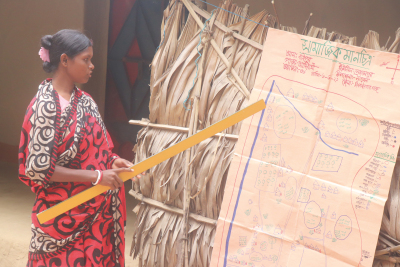The microfinance system has been established in Bangladesh and India since the mid-1970s and was considered a minor revolution at the time: for the first time, people were given the opportunity to borrow money from development organizations on a short-term basis without becoming dependent on the often dubious local middlemen who worked with interest rates of up to 250 percent. Since then, microloans have become a fixed part or even main focus of business for many organizations.
But even with these micro credits, the work must yield a profit in order to secure a livelihood. Consequently, these credits are primarily granted to people who are able to repay at least a small amount. This reduces the risk. A major problem here is that the people concerned cannot always use their microcredits productively. Instead, they will use them for food and subsistence - and thus use up the money in the short term. As a result, they have to keep borrowing new money and are driven into debt. In comparison, people who are already living in extreme poverty and have neither property nor income are unable to repay interest amounts from the outset, no matter how small. They are therefore considered uncreditworthy and do not even get the chance to receive the organizations' quick loan.
For NETZ and its local partners, the focus is on working with precisely these people: single women, indigenous communities, people with disabilities, and families who suffer from chronic malnutrition and whose average daily per capita income of less than 30 euro cents is far below the international poverty line. Because repayments are not feasible for those affected due to their living situation, especially at the beginning of the cooperation, NETZ and partners have developed the approach of start-up "capital". This means: The affected people receive productive goods - mostly animals or agricultural goods - with which they can build up an economic existence. In return, they do not have to pay anything back and thus have neither a debt to pay nor time pressure - so that they can concentrate entirely on the sustainable development of their homes.










